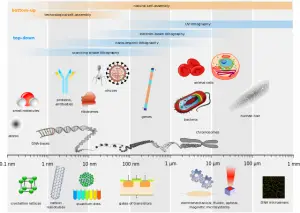A recent study published in the December 2014 issue of Environmental Toxicology found that increased exposure to nanoparticles can potentially lead to elevated risk of cardiovascular diseases. As the consumption of nano-based products continues to rise at exponential rates, this research sheds light on the potential health hazards new technology can have on our bodies to ensure that we take these issues into consideration during nanotechnology development.
According to the nanoscopic scale one nanometer equals about a billionth of a meter. Now that is small! They also range in shapes, sizes and materials, and can express different properties under different circumstances, making them key to the development of new technologies.
 Nanotechnology aka “nanotech” refers to the manipulation of these particles on the molecular level. These structures have such diverse applications and have taken on the interest of various fields including, but not limited to: science, medicine, and government. The applications run the gamet from self-cleaning products to quantum computing and medicine to solar energy. As nanotech continues its reign, it’s always important to take time and examine the potential environmental and health impacts of these emerging technologies. Studies have shown that nanoparticles may have adverse effects on the environment and now suggest that they can be detrimental to our health.
Nanotechnology aka “nanotech” refers to the manipulation of these particles on the molecular level. These structures have such diverse applications and have taken on the interest of various fields including, but not limited to: science, medicine, and government. The applications run the gamet from self-cleaning products to quantum computing and medicine to solar energy. As nanotech continues its reign, it’s always important to take time and examine the potential environmental and health impacts of these emerging technologies. Studies have shown that nanoparticles may have adverse effects on the environment and now suggest that they can be detrimental to our health.
Read this article at - http://thefutureofthings.com/8764-nanoparticle-research-shows-negative-health-effects-associated-with-nanotechnology/
What are Nanoparticles and Nanotechnology?
Nanoparticles (NPs), sometimes referred to as ultrafine particles (UFP), are particles that range between 1 and 100 nanometers in size.According to the nanoscopic scale one nanometer equals about a billionth of a meter. Now that is small! They also range in shapes, sizes and materials, and can express different properties under different circumstances, making them key to the development of new technologies.

Nanoscopic Scale: Biological and Technological Scales (Credit:http://en.wikipedia.org/wiki/Nanoscopic_scale)
Read this article at - http://thefutureofthings.com/8764-nanoparticle-research-shows-negative-health-effects-associated-with-nanotechnology/